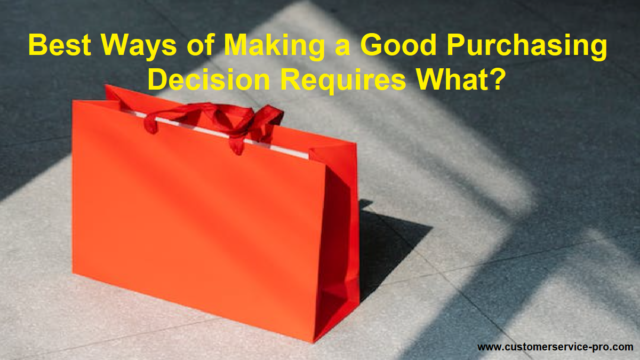Best Ways of Making a Good Purchasing Decision Requires What?
In a world filled with choices, making a good purchasing decision is an art form. From everyday essentials to big-ticket items, the choices we make when buying things can significantly impact our lives. But what does it take to make a good purchasing decision? Here, we will discuss the essential elements that play an important role in ensuring you make the right choices when it comes to spending your hard-earned money.
Table of Contents
- Understanding Your Needs and Wants
- Setting a Budget
- Doing Your Research
- Considering Quality
- Reading Reviews and Seeking Recommendations
- Comparing Prices
- Evaluating Long-Term Benefits
- Assessing Warranty and Customer Support
- Avoiding Impulse Purchases
- Environmental and Ethical Considerations
- Testing Before Buying
- Taking Advantage of Sales and Discounts
- Understanding Return Policies
- Seeking Advice from Experts
- Finalizing Your Decision
1. Understanding Your Needs and Wants
Before embarking on any purchasing journey, it’s essential to have a clear understanding of your needs and wants. Distinguishing between what you need and what you want can help you prioritize your spending.
2. Setting a Budget
A crucial step in making a good purchasing decision is setting a budget. Determine how much you are willing to spend on the item and stick to it. This prevents overspending and financial regrets.
3. Doing Your Research
Research is your best friend when it comes to making informed decisions. Dive deep into the product or service you intend to purchase. Understand its features, benefits, and potential drawbacks.
4. Considering Quality
Quality matters. Opt for products or services that are known for their durability and reliability. Sometimes, it’s worth investing a little more for higher quality.
5. Reading Reviews and Seeking Recommendations
Take advantage of online reviews and seek recommendations from friends and family. Real-world experiences can provide valuable insights into a product’s performance.
6. Comparing Prices
Don’t settle for the first option you come across. Compare prices from different sellers or providers. You might find the same product or service at a better deal elsewhere.
7. Evaluating Long-Term Benefits
Think beyond the immediate purchase. Consider how the item will benefit you in the long run. Will it save you money or enhance your life?
8. Assessing Warranty and Customer Support
Check the warranty and customer support options. A reliable warranty and accessible customer support can save you from headaches down the road.
9. Avoiding Impulse Purchases
Impulse purchases can lead to buyer’s remorse. Take your time to make a decision and resist the urge to buy on a whim.
10. Environmental and Ethical Considerations
In today’s world, it’s crucial to consider the environmental and ethical implications of your purchases. Support brands that align with your values.
11. Testing Before Buying
Whenever possible, test the product or service before making a final decision. This hands-on experience can reveal hidden issues.
12. Taking Advantage of Sales and Discounts
Keep an eye out for sales and discounts. Timing your purchase right can lead to significant savings.
13. Understanding Return Policies
Familiarize yourself with the seller’s return policies. Knowing your options in case of dissatisfaction is essential.
14. Seeking Advice from Experts
For complex purchases, seek advice from experts in the field. Their insights can be invaluable in making the right choice.
15. Finalizing Your Decision
After considering all the factors, finalize your decision with confidence. Trust that you’ve made the best choice based on your research and needs.
Conclusion
Making a good purchasing decision is not a one-size-fits-all process. It requires a combination of careful planning, research, and self-awareness. By following these steps and considering the various factors involved, you can increase the likelihood of making purchases that you’ll be satisfied with in the long run.
Remember, making a good purchasing decision is an investment in your satisfaction and well-being. Take the time to evaluate your options, and you’ll find that your choices become not just good but great. So, go ahead and make those informed decisions, and may your purchases bring you joy and utility.
FAQs
- How can I avoid impulse purchases?
- Avoid impulse purchases by creating a shopping list and sticking to it. Also, give yourself a cooling-off period before making non-essential purchases.
- Why is it essential to consider long-term benefits when making a purchase?
- Considering long-term benefits helps you assess the true value of a product or service, ensuring that it aligns with your goals and needs.
- What should I do if I’m torn between two similar options?
- In such cases, weigh the pros and cons of each option and consider which one aligns better with your priorities and budget.
- How can I stay within my budget when shopping for big-ticket items?
- To stay within your budget, set a strict spending limit, research thoroughly, and be prepared to negotiate for a better deal.
- Why is it important to support environmentally and ethically conscious brands?
- Supporting such brands promotes sustainable and ethical practices, contributing to a better world while ensuring you align with your values.







